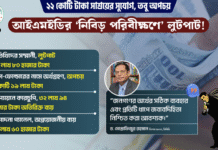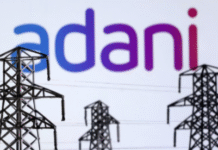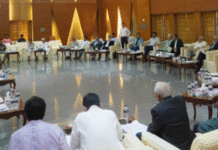Scope to whiten black money is wrong
 The budget is a routine one. It is 18 per cent larger than the last one, though that won’t be achieved. Every year, expenditure is increased by 2 per cent more than income. While this budget does have some new elements, it hasn’t been able to break away from this trend that has continued over the last 10 years. Only time will tell if we will ever emerge from this cycle.
The budget is a routine one. It is 18 per cent larger than the last one, though that won’t be achieved. Every year, expenditure is increased by 2 per cent more than income. While this budget does have some new elements, it hasn’t been able to break away from this trend that has continued over the last 10 years. Only time will tell if we will ever emerge from this cycle.
Every year an ambitious target is set for revenue earnings, and then there is a deficit. This time the target had been set at Tk 2.96 trillion (Tk 2,96,000 crore) and then it was adjusted and decreased to Tk 2.80 trillion (Tk 2,80,000 crore). The revenue shortfall is likely to be Tk 700 billion (Tk 70,000 crore). That means the revenue collection may reach Tk 2.25 trillion (Tk 2,25,000 crore).
In 2017-18, revenue earnings were Tk 1.87 trillion (Tk 1,87,000 crore). Revenue collection is obviously the major challenge. Failure to bring about reforms in the administration has led to this situation. There are plans every year, but no systemic change. It is not possible to reform the tax system overnight. It will need three or four years of planning to activate an inert National Board of Revenue (NBR). Changing the chairman or the members is not enough, the character of NBR has to be changed.
Then again, how can there be expenditure with no income? If currency is printed for expenditure, inflation will shoot up. Economic equilibrium will be upset. So the government will try to implement the budget with loans from savings certificates. And in order not to exacerbate the liquidity crisis, instead of taking loans from scheduled banks, the government will borrow money from Bangladesh Bank. The central bank will print money and hand it over to the government. This will create pressure on the exchange rate and on inflation. It can be done to a limited extent. Any excess will create problems. This needs to be extremely carefully handled.
Scope is being provided to whiten black money through investments in hi-tech parks and economic zones. This is, ethically speaking, totally unacceptable. If money is earned through unlawful means, in no way should it be allowed to be whitened. The prime minister herself has said that taking bribes and paying bribes is equally wrong.
The allocation for youth is commendable. However, careful watch must be kept on how this is spent as in the past such funds for entrepreneurs were misused. Funds for women entrepreneurs remained unutilised.
Taxes in the mobile phone sector are higher in our country than anywhere else in the world. I am always against imposing tax on mobile phone talk time. It simply serves to reduce people’s talking time. It is like taxes shouldn’t be imposed on financial transactions. If 45 per cent tax is imposed on mobile phone companies, this will discourage foreign investors. NBR wants to sit back and rake in the revenue and so has imposed these fresh taxes on mobile phones.
Increasing tax on cigarettes is fine. Taxes should be increased on ‘bidi’ and chewing tobacco like ‘zarda’ and ‘gul’ in order to stop the consumption of such products.
Incentive can be given to those exporting new garments to new overseas markets. But those who are already availing such incentives, should not be given further facilities. If the currency is devaluated, no exporter of any sector will require any other incentive.
Increased tax on edible oil, powdered milk and sugar is all right.
It hasn’t been correct to offer incentive for remuneration from non-resident Bangladeshis. The International Monetary Fund law says that the same currency cannot have different values. Here too, devaluation of the taka is adequate incentive.
For the first time the government has admitted that there are problems in the banking sector. There has been talk of mergers, penalty for loan defaulters, bond market, etc. We want to see action from next month. All action must be taken through a commission or committee. Defaulters, even the largest five defaulters, must be punished.
The bank sector crisis is creating problems for the entire economy. We are waiting to see when the government will take action in this regard. Weak banks must be merged or removed by any other means from the market. Plans must be taken up for world standard banks to be set up in the country.
The government determines interest rates, but these are not implemented. Just as the share market cannot be pulled up or pushed down at will, interest rates too cannot be fixed at will. If the government has the political commitment to do so, the banking sector can be fixed. The central bank must be given full independence and empowered.
The government expenditure on interest has increased significantly. It must be conscious about this. The government’s pension expenditure is rapidly increasing. There has to be a pension fund, the benefits of which will be manifest to 15 to 20 years.
Subsidies are yielding good results. Subsidies can remain in the agriculture sector. Various government establishments have been given Tk 45 billion (Tk 4500 crore) in subsidy which is being totally wasted. The power sector is being subsided due to over-evaluated and small plants. We are just not breaking away from this. We still have been unable to set up a large power plant. Everyone is making a packet of money and the country faces losses.
Subsidy of Tk 95 billion (Tk 9500 crore) is being paid for Liquefied Natural Gas (LNG). This cannot be a sustainable model. The manner in which subsidy is being meted out en masse will have a negative impact on the budget. Wasteful subsidy must be halted.
* Ahsan H Mansur is executive director, Policy Research Institute. This piece appeared in the print edition of Prothom Alo and has been rewritten in English by Ayesha Kabir.









